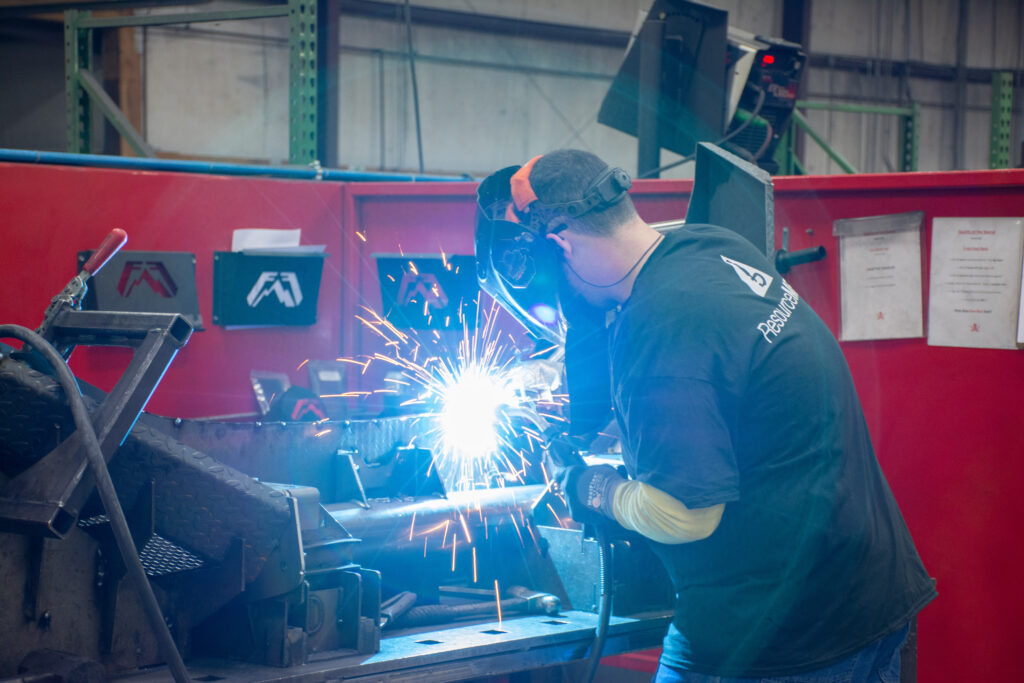Welding skills for Career Advancement
Skills for welding to advance your career
Have you been looking for a way to take your welding career to the next level? Whether you’re looking into how to become a welder or you’re a seasoned professional looking to upskill, we’re taking a closer look at essential welding skills.
Key responsibilities of welding professionals
Skilled welders are at the heart of ensuring structural integrity and safety for industrial and construction projects. These professionals are responsible for joining metal components through specific welding techniques, serving as key players in industries like construction, manufacturing, automotive, aerospace, shipbuilding, and more.
What are the main tasks professional welders carry out?
- Welding or fusing metal components using various techniques
- Verifying the structural soundness of welded joints
- Working from technical drawings and reading blueprints to execute precise welds
- Choosing the appropriate welding materials and preparing surfaces for welding
- Operating and maintaining welding machines while ensuring safety and effective use
- Inspecting finished welds for quality and conformity to industry standards and project requirements

What are the critical welding skills needed for career success?
If you’re interested in a successful your welding career, there are a few essential skills you’ll need.
1. Precision and attention to detail
In welding, precision and meticulous attention to detail are paramount. To ensure structural integrity and safety across projects, a skilled professional must be flawless. Why? Because even minor mistakes can lead to significant repercussions, including costly rework, safety hazards, and project delays.
2. Technical proficiency
Experienced welders must possess a deep understanding of the various techniques, welding equipment, and materials they plan to use. Proficiency in these technical aspects allows professionals to adapt to a wide range of projects and continue to work with confidence.
If you’re not sure where to begin, the National Board of Boiler and Pressure Vessel Inspectors reports that shielded metal arc welding is the most popular welding process and a recommended starting point for its versatility and simplicity.
3. Safety consciousness
Because a welding career comes with inherent risks, safety awareness is non-negotiable. To ensure their protection, and that of those around them, a skilled welder must stay conscious of potential hazards, adhere to safety protocols, and use the right protective gear. This is also key to upholding industry standards and maintaining compliance.
4. Mathematical skills
According to the MIAT College of Technology, professional welders require a range of math skills, including familiarity with fractions, decimals, geometry, formulas, and trigonometry. This know-how is essential for accurately:
- Measuring materials and calculating the necessary cutting force
- Understanding the impact of heat on metal and how to weld seams together
- Reading and comprehending the scales used on blueprints
- Determining the precise amount of materials needed for a job
5. Physical strength and stamina
While not always considered, welding is a physically demanding profession — often requiring these individuals to work in different environments under uniquely challenging conditions. The Bureau of Labor Statistics explains that welders should be prepared to endure long stints of standing and performing repetitive movements, lifting heavy metal pieces, and reaching and bending.
4 strategies to improve your welding skills
Fortunately, whatever stage you’re at in your welding career, there are multiple opportunities to elevate your professional skills. Here are four strategies to consider:
- Seek continuous learning opportunities: Welding skills aren’t automatically mastered once you start working. Advance your welding skills by committing to ongoing education, such as attending workshops and courses or staying updated with industry trends.
- Practice, practice, practice: You’ve heard the saying “practice makes perfect;” the same rules apply to professional welding. Take the time to fully understand your techniques and equipment by working on a variety of projects that can help you refine your expertise and gain hands-on experience.
- Ask for feedback: Constructive feedback is invaluable for improvement. Reach out to experienced welders, coworkers, and organizational leaders to identify areas for growth. You might also join welding communities or talk to a mentor to get the feedback you need.
- Prioritize safety first: It’s worth mentioning again that safety is always paramount in welding practice. Foster a safeguarded work environment every time you start a project to provide everyone involved with confidence and allow you to focus on the task at hand without compromising your well-being.
Make your next welding career move with confidence
Industries are consistently in need of skilled welders, and ResourceMFG is here to support your professional goals and connect you with your next role. With a strong commitment to unlocking individual potential and fostering innovation within the industry, ResourceMFG values personal growth and serves as a bridge to better career opportunities.
If you’ve been looking for a partner to help you build a fulfilling career in welding, explore all of our welding opportunities.